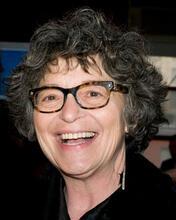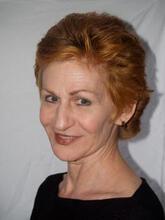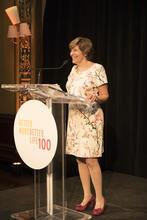Gail Twersky Reimer
Gail Twersky Reimer was born to Holocaust survivors who came to the United States shortly after the end of World War II. Stories of her parents’ experiences helped to propel her later mission of telling women’s stories. After earning a PhD in English, Reimer taught at Wellesley college, where she worked to increase women’s representation in the curriculum and participated in the new women’s studies program. After several years at the Massachusetts Foundation for the Humanities, in 1995 she started the Jewish Women’s Archive, which sprang from her belief that unless the stories of Jewish women were to be deliberately collected and preserved, their history would be reduced to fragments or lost forever. JWA pioneered an innovative digital technology, becoming one of the first online archives and the only national organization dedicated to Jewish women’s history.
Teacher, writer, editor, passionate advocate for the humanities, and visionary pioneer of Jewish feminism, Gail Reimer founded the Jewish Women's Archive (JWA) in 1995 to ensure that Jewish women's stories would become integral parts of the historical record. Under Reimer's leadership, JWA pioneered the use of virtual technology in collecting, chronicling, and transmitting knowledge of Jewish women's lives. As director for its first two decades, Reimer built JWA into an influential educational and historical organization that transformed the way Jewish history was told, creating myriad resources about Jewish women and energizing scholars, teachers, and learners to participate in their collection and usage.
Family
Reimer's family background propelled her mission of telling women's stories. Born in Queens, New York, on July 10, 1950, to Holocaust survivors who came to the United States shortly after the end of World War II, Reimer grew up hearing stories of her parents' experiences during the war, about which they spoke openly. Her mother, Natalia Geizhals Twersky, was an expert storyteller who narrated accounts of her time in a concentration camp at Auschwitz, where her actions helped to save family and friends. Reimer's father, David Twersky, also spent the war years in concentration camp. "I [always] got the message that my parents didn't survive just to live," Reimer commented. "They survived so that I could do something in the world that mattered." The desire to put heroic stories like Natalia's into the historical record, where women's experiences were much neglected, became a motivating force.
From her father, Reimer inherited the powerful legacy of the Hasidic Twersky dynasty. Her paternal grandfather, Rabbi Yehuda Leib Twersky of Kielce, Poland, had a large following before he died in 1940 after being tortured by the Gestapo. Though urged to claim his father's mantle after the war, David Twersky spent his life as a businessman and entrepreneur, serving as synagogue president and raising hundreds of thousands of dollars for Jewish organizations.
Natalia Geizhals came from a religious family in Krakow, where her father edited the Yiddish newspaper, Di Yidishe Shtime, and ran a print shop. The skills Natalia learned assisting her father would prove useful in wartime. Natalia married David Twersky in 1939, giving birth to a son, Jack, the following year. To remain with her family, she refused the opportunity to work in a factory on Oskar Schindler’s list. The family was deported to Plaszow, a concentration camp on the edge of Krakow, in 1943. Natalia smuggled Jack out of the camp and into the care of a Gentile friend, with whose family he remained for the duration of the war. After being transferred to Auschwitz, Natalia was assigned to be a kapo in charge of a printing press, enduring brutal beatings to protect women in her charge. Natalia's resilience and the aid she extended to women prisoners continued throughout the Death March in 1945 and internment in a camp at Ravensbrück. After her camp was liberated, she reunited with her son and husband, who had spent the final years of the war in a concentration camp in Austria. In 1946, they left Germany for New York, where Reimer was born four years later.
Education
Reimer grew up in Kew Garden Hills in Queens with her parents, brother, and nine aunts and uncles, whom her mother had helped to resettle in the United States after the war. She attended Yeshiva of Central Queens, the first Jewish day school to have a dance program integrated into the school curriculum. Joyce Mollov, the program’s founder, introduced her to Israeli dance, which became a lifelong passion. Summers at Camp Massad in the Poconos enhanced this exposure.
Reimer commuted to Manhattan for four years to attend Ramaz, a private Modern Orthodox high school with a dual English and Jewish curriculum. The school's innovative course on social sciences, taught by Judith Hurwich, introduced her to interdisciplinary methods. Another on world literature stimulated a lifetime engagement with literary studies. A third course on the Book of Genesis, titled Fathers and Sons, taught her close textual reading. Although at the time Reimer did not focus on the course's neglect of women's voices, over time she came to reflect on this absence. The experience contributed to her desire to create a new Biblical scholarship that included and amplified women's voices.
Although Reimer edited the school newspaper at Ramaz, most of her extracurricular activities focused on dance. The 92nd Street Y, a central address for dance education and performance, was located just a few blocks from the school. Reimer spent much time there, studying Israeli dance with Fred Berk and attending modern dance concerts. As a junior in high school, she began choreographing for the annual Israel Folk Dance Festival held in Carnegie Hall and was accepted into the Connecticut College American Dance Festival’s program for high school students, directed by Muriel Maning. There she studied with prominent dancers from leading modern dance companies.
Her interest in dance led Reimer to attend Sarah Lawrence College. Although she began her college career in the Dance Department, she soon found herself more engaged with her literature and philosophy courses. After her freshman year, she met Joseph Reimer, one of the founders of Havurat Shalom, an innovative egalitarian Jewish community. They married after her junior year, which she spent in Israel. Reimer spent her final college year as a special student at Harvard, where her husband was pursuing a graduate degree in education. A Harvard course given by Gail Parker—one of the first women's history courses in the United States—stimulated her interest in women's contributions to history. After Reimer graduated from Sarah Lawrence in 1972, she and her husband spent the next year in Israel, where she worked notating ethnographic dance films for the Folklore Department at Hebrew University, as a counselor on Jewish Agency college student tours, and as a translator and advisor to Israelis heading to America on behalf of the Foreign Ministry.
Returning to the United States in the fall of 1973, Reimer began PhD studies in the English Department at Rutgers University. After her first month at Rutgers, the Arab-Israeli War broke out, and Reimer took a semester's leave to return to Israel, where she volunteered in a kibbutz to replace residents who had gone to war. She resumed graduate studies at Rutgers in Spring 1974, specializing in nineteenth-century Victorian literature and writing her doctoral thesis on George Eliot.
Growing Interest in Feminist Scholarship
In the Fall of 1980, Reimer joined the faculty of Wellesley College, where she remained until 1987. From the outset, she found the English department's curriculum lacking in the full representation of women, and worked to broaden it. She also participated in the college's new women's studies program and developed an association with the Center for Research on Women housed at the college. With a fellowship from the American Association of University Women, Reimer spent the 1984-1985 academic year as a fellow at the Bunting Institute of Radcliffe College, immersing herself in women's and feminist studies and becoming familiar with Radcliffe's Schlesinger Library on the History of Women. She returned to Wellesley as a more self-aware feminist, offering a new course on mothers and daughters in literature and continuing to advocate for the inclusion of a broader range of women's experiences into the curriculum. In 1987, Reimer received Wellesley's Anna and Samuel Pinanski Prize for excellence in teaching. She resigned from Wellesley shortly thereafter, wishing to find a wider scope than the college campus for interpreting the humanities and women's lives and roles in them.
As a memorial to her mother, who died in 1988, Reimer edited a collection of essays on the Book of Ruth with literary scholar Judith Kates. With contributions from women scholars and writers in a variety of fields, Reimer hoped the book would broaden the definition of what it meant to be a Jewish woman and to empower readers to become interested in Jewish study, themes that carried through to her later work. Reading Ruth: Contemporary Women Reclaim A Sacred Story was published in 1994. She and Kates also edited Beginning Anew: A Woman's Companion to the High Holy Days, which provided commentaries on the holidays' Torah and Haftorah readings from a gender perspective.
Reimer joined the Massachusetts Foundation for the Humanities (MFH), the state arm of the National Endowment for the Humanities, in 1987. As a program officer tasked with creating the Foundation's Boston office and later as Associate Director of the Foundation, she fostered collaborations among scholars, artists, and writers and designed dozens of programs for a wide range of public constituencies, including programs on the impact of AIDS, the problematic issue of censorship, and conflicts over school curricula.
Founding the Jewish Women’s Archive
In 1995, Reimer left the MFH to start the Jewish Women's Archive. The organization sprang from her belief that unless the stories of Jewish women were to be deliberately collected and preserved, their history, like that of her mother and the stories of the Biblical women portrayed in her anthologies, would be reduced to fragments or lost forever. The work of a rising group of feminist historians who were documenting Jewish women's pasts, and in particular a 1993 conference on Jewish women's history at Brandeis University, provided inspiration. With the financial support of philanthropist Barbara Dobkin, whom Reimer met at a Jewish Funders Network conference, she created JWA to collect, chronicle, and convey the experiences of North American Jewish women. Social change and women's empowerment were powerful motivating factors for both Reimer and Dobkin.
Rather than a library that stored materials in a physical space, Reimer conceived of the archive as a digital repository open to anyone with internet access, enabling the online collection of materials and their transmission to the general public through a state-of-the art website. It collected materials about ordinary as well as notable women and was available to nonprofessional as well as scholarly users from a wide variety of backgrounds. Under her leadership, the Archive emerged as an independent nonprofit institution, not connected to any umbrella institution within the Jewish or academic communities. To present new ways of telling the stories of Jewish women, it pioneered an innovative digital technology, becoming one of the first online archives and the only national organization dedicated to Jewish women's history. Public and community programs, oral histories, posters, films, curriculum materials, and other documentary sources amplified its reach and scope. At Reimer's urging, JWA brought the Encyclopedia of Jewish Women onto its website in 2009, making it freely accessible to anyone with an internet connection. It soon attracted more than a million users each year from around the globe.
Recognition
Reimer has received many awards and honors. In 2001, the Forward named her as one of the 50 most influential Jews of the year. In 2006, Womens e-news chose her as one of its 21 Leaders for the 21st century. In 2011, she was honored by Auburn Theological Seminary at its “Lives of Commitment” event and awarded the Dr. Benjamin J. Shevach Memorial Award for distinguished achievement in Jewish educational leadership by Hebrew College. In 2012, she received the American Jewish Distinguished Service Award from Hebrew Union College-Jewish Institute of Religion, and in 2014 she was awarded the Lee Max Friedman award for distinguished service in the field of American Jewish History by the American Jewish Historical Society.
Reimer lives in Brookline, Massachusetts, and is the mother of two daughters, Tamara, a psychologist, and Ziva, a professor of Jewish education at Brandeis University, and grandmother to four. She has served as member of the board and president of the Rashi School, Boston's first Reform Jewish day school. After retiring as JWA's director, Reimer produced a film about Regina Jonas, the first woman to be ordained as a rabbi, and continues to research and write about Jewish women.
Selected Works by Gail Reimer
“Henrietta Szold: A Pretty Perfect Miriam.” In Gender and Religious Leadership, edited by Hartmut Bomhoff, Denise L. Eger, Kathy Ehrensperger, Walter Homolka. Lanham, MD: Lexington Books, an imprint of The Rowman and Littlefield Publishing Group, Inc., 2019
"Jewish Women’s Archive: Ein Archiv fur das 21.Jahrhundert." Jalta No.3, 2018: 34-37.
“Judith Berg: Dancing the Jewish Past, Creating a Jewish Future?” Jewish Women in Europe: Creating Alternatives. Bet Debora Journal, Hentrich & Hentrich, Berlin, 2018: 48-58.
“Regina Jonas: The Shifting Sands of Memory.” Engendering Jewish Politics, Bet Debora Journal, Hentrich & Hentrich, Berlin, 2017: 13-22.
In the Footsteps of Regina Jonas: short documentary, Director and Producer, JWA Productions, Inc., 2014.
“The Jewish Women’s Archive – Rethinking the Archive of the 21st Century.” In Judisches Archivwesen, edited by Frank M. Bischoff, Peter Honigmann. Archivschule Marburg, 2007.
“Women on the Wall.” Studies in Jewish Civilizations: Women and Judaism, edited by Leonard J. Greenspoon, Ronald A. Simkins, Jean Axelrad Cahan. Omaha, NE: Creighton University Press, 2003.
"Eschewing Esther/Embracing Esther: The Changing Representations of Biblical Heroines." In Talking Back: Images of Jewish Women in American Popular Culture, edited by Joyce Antler, 207-219. Waltham, MA: Brandeis University Press, 1998.
Beginning Anew: A Woman’s Companion to the High Holidays, co-edited with Judith Kates. New York: Simon and Schuster, 1997.
Reading Ruth: Contemporary Women Reclaim a Sacred Story, co-edited with Judith Kates. New York: Ballantine Books, 1995.
“Revisions of Labor: Margaret Oliphant’s Autobiography.” In Life/Lines: Theoretical Essays on Women’s Autobiography, edited by Celeste Schenck and Bella Brodzki. Ithaca, NY: Cornell University Press, 1988.
Antler, Joyce. You Never Call, You Never Write! A History of the Jewish Mother. New York: Oxford University Press, 1997, pp. 210-213.
Ashton, Dianne. "Finding Gail Reimer in the Dictionary." In Why Jewish Women's History Matters: An Archive of Stories in Honor of Gail Reimer, edited by Joyce Antler. Boston: 2014, pp. 1-2.
Cohen, Debra Nussbaum. "The Sisterhood: 18 Years of the Jewish Women's Archive." The Forward, May 7, 2014.
Friedman, Jeanette. "Gail Reimer: preserving history." Lifestyles 5762, volume 30, no.178 (Pre-spring 2002): 33-35.
Novis, Carol. "Women's Work in Progress: An American archive seeks to transform the way the history of half of American Jewry is collected and recorded." The International Jerusalem Post, June 8, 2001, 21-22.
Raub, Deborah Finbaum. “Profile: Gail Reimer," Hadassah Magazine, February 2008, 55-57.
Tenenbaum, Shelly. "Natalia Twersky: A JWA Foremother." In Why Jewish Women's History Matters, edited by Joyce Antler. Boston: 2014, pp. 9-12.
Wenger, Beth. "Jewish Women’s Archive as Harbinger: Jewish Women’s History and the Digital Humanities." In Why Jewish Women's History Matters, edited by Joyce Antler. Boston: 2014, pp. 2-4.















